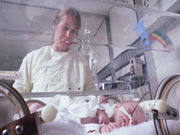Fragmented communication, complex information, and uncertain prognosis difficult for parents
MONDAY, Aug. 8, 2016 (HealthDay News) — Three themes have been identified as communication challenges in neonatal encephalopathy and therapeutic hypothermia, according to a study published online Aug. 3 in Pediatrics.
Monica E. Lemmon, M.D., from the Johns Hopkins School of Medicine in Baltimore, and colleagues conducted semi-structured interviews with parents whose infants were enrolled in a study of therapeutic hypothermia from 2011 to 2014. Twenty interviews were conducted until thematic saturation was achieved.
The researchers found that three principle themes characterized parental experience of communicating with clinicians. Theme one highlighted a fragmented communication process, which reflected the chaotic maternal and neonatal course. Parents often received key information about neonatal encephalopathy from maternal clinicians; infant medical information was often given to one family member; and the bedside nurse was perceived as the primary source of communication for most families. Theme two included the challenges of discussing such a complex therapy; families were grateful for clinicians who used lay language and provided written material, and reported feeling overwhelmed by technical information. Theme three encompassed the uncertain prognosis following encephalopathy. Parents appreciated being given specific expectations for their infant’s long-term development.
“Communicating complex and large volumes of information in the midst of perinatal crisis presents inherent challenges for both clinicians and families,” the authors write. “We identified an actionable set of communication challenges that can be addressed with targeted interventions.”
Full Text (subscription or payment may be required)
Copyright © 2016 HealthDay. All rights reserved.








